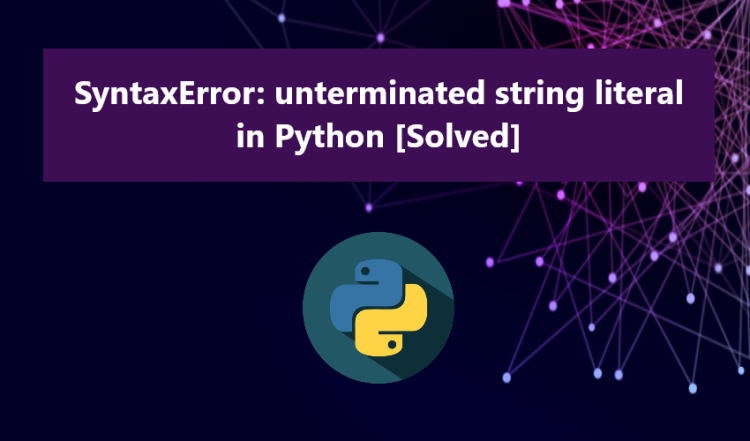S7sbeek
Shell Master
2
MONTHS
2 2 MONTHS OF SERVICE
LEVEL 1
400 XP

This article delves into exploring the causes and solutions for the Python Error that reads as SyntaxError: unterminated string literal. If you are new in Python programming language and currenly facing this error, this article will provide you some insights on why this error arises and how to fix it.
What is Python SyntaxError?
Python comes with multiple type of possible errors to occur and of these is called the SyntaxError. Basically, the SyntaxError arises when developers writes a python code with invalid syntax. The error occurs in many reason and these includes the following:
- Using the reserved keywords
- Improperly Placed Quotes
- Improper Indentions
Aside from SyntaxError, Python also throws an AttributeError such as AttributeError: 'list' object has no attribute 'lower' and a TypeError such as TypeError: 'dict_values' object is not subscriptable.
Why does the Python SyntaxError: unterminated string literal
occurs?
Basically, the SyntaxError: unterminated string literal emerges due to a failure of closing the string. For example, if you define a string object using single quote ( '
) and did not close the string with the same quote, the SyntaxError with the said message will be thrown during execution of the script and will result to crash or immediate stop of the project. This error may occur due to some other reason such as the following:
- Improperly Defining a Multiple Line String
- String Ends with Backslash (\)
Improperly Defining a Multiple Line String
Defining an Improper Multiple Line String in Python will cause the . If you are defining the multi-line string value with a single or double quote, Python will only look for the closing quoation on the same line. Assuming we have the following script:
- #sample string
- message =
"Lorem ipsum dolor sit amet,
- consectetur adipiscing elit.."
- #output
- print
(
message)
Executing the script will throw the said SyntaxError because the Python can't find the closing quote in the same line.
Solution 1
On this scenario, we can avert the error by escaping the the next line with a backslash ( \
). In this way, the Python will continue to look the closing quote on the next line but will not serve the next line as part of the string.
- #sample string
- message =
"Lorem ipsum dolor sit amet, \
- consectetur adipiscing elit.."
- #output
- print
(
message)
Solution 2
Python also offers triple quotes, which can be either triple double quotes (""") or triple single quotes ('''). The primary purpose of triple quotes is to create multi-line strings in Python, which is precisely what we need to prevent the error in the provided scenario.
- #sample string
- message =
"""Lorem ipsum dolor sit amet,
- consectetur adipiscing elit.."""
- #output
- print
(
message)
Here's another sample snippet that often triggers the unterminated string literal error in Python:
- #Simulating the error #2
- #sample string
- path =
'C:\f
older1\'
- #output
- print(path)
As evident in the provided snippet, we are trying to define a file path within a path string object or variable. This path includes backslashes, especially at the end of the string or just before the closing quote of the string. This results in the closing quote being treated as part of the string, causing Python to raise the unterminated string literal error due to the absence of a closing quote.
Solution 2.1
In the provided scenario, we can resolve the issue by employing the same approach as in Solution 1, which involves utilizing a backslash to escape the character that follows. Refer to the following snippet for a clearer understanding:
- #sample string
- path =
'C:\\
folder1\\
'
- #output
- print
(
path)
Conclusion
In simple terms, the SyntaxError: unterminated string literal error in Python occurs when a defined string object is not properly closed with the required closing quote. This error often arises when working with multi-line string objects. You can resolve this error by implementing the solutions I've provided above.
There you have it! I hope that this article will assist you in resolving the issue you are currently facing and will also serve as a valuable resource to prevent such errors from occurring in the future.
Feel free to explore this website for more Free Source Codes, Tutorials, and articles covering a wide range of programming languages.
Happy Coding =)